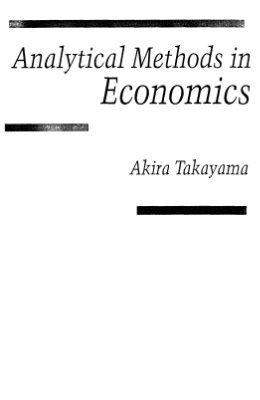Harvester Wheatsheaf, 1994. - 640 Pages.
This book is more readable than his "Mathematical Economics" since it is not based on an axiomatic approach in dealing with the problems.
This book attempts to introduce some of the mathematical tools that are relevant to economics (espically micro). Proofs of the theorems are mostly omitted. There is a chapter introducing or reviewing some basic mathematics. Main topics are non-linear programming, uncertainty, differential equation and optimal control theory.
The treatment on non-linear programming is excellant. It is a good book for graduate students major in economics. But it requires some basic knowledge in mathematics.
This book is more readable than his "Mathematical Economics" since it is not based on an axiomatic approach in dealing with the problems.
This book attempts to introduce some of the mathematical tools that are relevant to economics (espically micro). Proofs of the theorems are mostly omitted. There is a chapter introducing or reviewing some basic mathematics. Main topics are non-linear programming, uncertainty, differential equation and optimal control theory.
The treatment on non-linear programming is excellant. It is a good book for graduate students major in economics. But it requires some basic knowledge in mathematics.

